Michelle Troconis Found Guilty In Jennifer Dulos Murder Conspiracy
A jury Friday found a Connecticut woman guiltyof conspiring with her boyfriend to kill his estranged wife, a mother of five who disappeared in 2019.
Michelle Troconis, 49, was also found guilty on five other counts of tampering with physical evidence and hindering prosecution connected to Fotis Dulos’ presumed killing of Jennifer Dulos, who was last seen dropping off their five children at school on the morning of March 24, 2019. The Duloses had been in the middle of a contentious two-year divorce battle and custody dispute, which placed strict restrictions on when and how Fotis Dulos could see the couple’s children.
The six-member jury deliberated for three days after hearing more than seven weeks of testimony before finding that Troconis helped Dulos create an alibi for the time of the killing, and later helped him clean up and dispose of evidence of the crime.
Troconis faces up to 50 years in prison, according to the Stamford Advocate, citing Connecticut state statute.
Jennifer Dulos’ body has never been found, but she was declared officially dead by a state judge in October.
Fotis Dulos was facing capital murder and kidnapping charges when he died by suicide in January 2020.
Troconis could be heard audibly crying as the verdicts were read, leaning against her attorney Jon Schoenhorn. After he whispered that she could sit, she put her head on the table and sobbed, with attorney Audrey Felsen rubbing her back as the jury was polled.
Connecticut Superior Court Judge Kevin Randolph set a bond of $6 million, denying her defense’s request that she remain free on her original bond of $2.1 million. Troconis was led out of the courtroom in handcuffs.
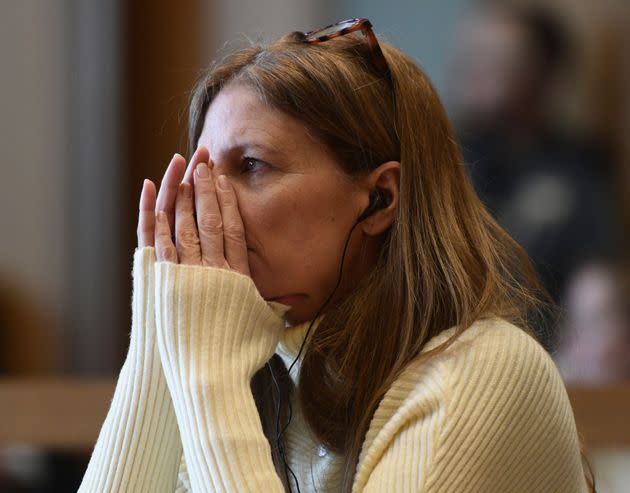
Jennifer Dulos’ family called the ruling a “crucial attribution of accountability” for “an unconscionable series of crimes” but emphasized that it is “not a victory” in a statement shared with HuffPost.
“There can be no victory when five children are growing up without their mother,” said Carrie Luft, a close friend of Jennifer Dulos’ and the family’s spokesperson. Despite the “immense body of evidence” presented at trial, Luft pointed out that Jennifer Dulos’ body still hasn’t been found and expressed the family’s hope that the publicity from the trial will generate new leads.
“In the meantime, Jennifer’s grace, goodness, and light live on through her children and through the honor of her memory,” Luft said.
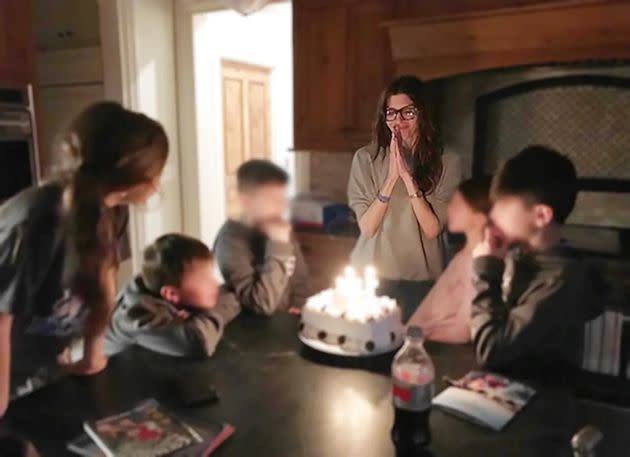
“This is not the trial of Fotis Dulos; this is the trial of Michelle Troconis,” Schoenhorn said in his closing argument Tuesday. But prosecutors first had to establish Fotis Dulos’ guilt to make the case that Troconis conspired with him in a murder — when the body of the victim has never been found.
Randolph dealt an early blow to the prosecution when he excluded testimony of the chief medical examiner, who had previously said that Jennifer Dulos had suffered “non-survivable injuries.” Without a body to examine, Dr. James Gill based his conclusion on evidence provided by investigators, including blood in Jennifer Dulos’ garage and bloody clothes that matched her DNA. Ultimately, Randolph ruled, “the jury has heard more than Dr. Gill could testify to.”
And Schoenhorn questioned whether prosecutors had proved that Dulos killed his wife. “It’s still unclear what happened,” he told jurors. “And unfortunately, this trial will not solve that puzzle. It will remain a mystery, an unfinished puzzle.”
Prosecutors presented hundreds of puzzle pieces to jurors over the course of 25 days of testimony and more than 150 exhibits. On Tuesday, they had just one hour to assemble the pieces for the jury in closing arguments, which they did in two parts, before and after Schoenhorn argued for the defense. (There were no opening statements, in accordance with Connecticut state law.)
Fotis Dulos’ alleged scheme required careful planning, multiple vehicles and hours of driving. Prosecutors said he drove 70 miles south from his Farmington home (where he also operated his luxury real estate development company) to Jennifer Dulos’ house in New Canaan, back up to Farmington (where he spent the afternoon at a property he was selling) and finally 10 miles to Hartford, this time driving his Ford Raptor with Troconis in the passenger seat. Based on a search warrant of Fotis’ phone, investigators were able to use location data to trace his movements that night and requested surveillance footage for the area, which was shown at trial.
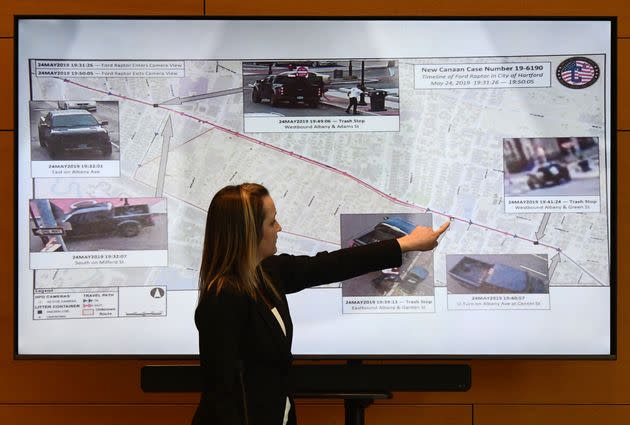
In the bed of the four-door pickup were numerous full black plastic garbage bags, whose numbers dwindled as he tossed them in various garbage bins along the way. Police said they were able to recover some of those bags and found inside a number of items linked to Jennifer Dulos and the crime, which were shown in court. The grim findings included a woman’s Vineyard Vines shirt and bra, both sliced down the middle and soaked in blood — later identified as Jennifer Dulos’ — a box cutter, two rain ponchos, a towel, four long zip ties, gloves and cleaning supplies that all appeared to be stained with blood.
Troconis claimed that she rode with Dulos specifically to go to Starbucks and wasn’t paying attention because it was not unusual for him to dump trash from their construction projects. At one stop, surveillance footage showed both Fotis and Troconis opening their doors. While Dulos walks around the truck and places a garbage bag in the bin, Troconis is seen opening the passenger door and reaching down to the sidewalk. He then approaches her and slides what appears to be a large envelope into a sewer grate under her open door. Investigators later recovered the envelope and found inside two Connecticut license plates that had been altered with tape. The plates had been used on a car registered to Fotis.
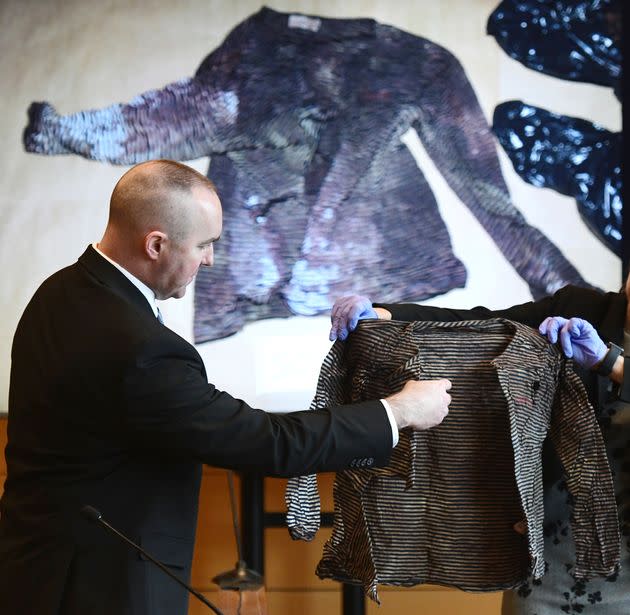
Cameras also captured him removing a “large, rigid object” consistent with a missing cargo liner from Jennifer’s Suburban and leaning it up against a building. It was never recovered.
Authorities believe that Fotis Dulos was lying in wait and attacked Jennifer Dulos in her own garage in New Canaan when she returned from the school just after 8 a.m. on March 24. To get there, police believe he drove his employee Pawel Gumienny’s Toyota Tacoma pickup, with his own bicycle in the back, parked it near Waveny Park, and cycled to the New Canaan mansion. After killing her, he drove her body in her own Chevy Surburban back to the park, leaving her SUV for searchers to find later while he returned to Farmington in Gumienny’s pickup, investigators said.
The murder conspiracy charge against Troconis relates to what she was doing that morning. According to prosecutors, she agreed to answer a prearranged call from Dulos’ friend in Greece to Dulos’ phone ― which he left in their home office ― but also to avoid having his movements tracked. Initially, Troconis and Dulos’ friend Kent Mawhinney (who is himself awaiting trial on a murder conspiracy charge in the case) said Dulos was with them in the office that morning. She also originally told police that she had woken up beside Dulos that morning, showered with him and had sex, but in a later interview admitted she had not seen him at all.
Prosecutors said Troconis and Dulos were following what investigators referred to as “alibi scripts” — a term they were barred from using during the trial — to account for their movements that day.
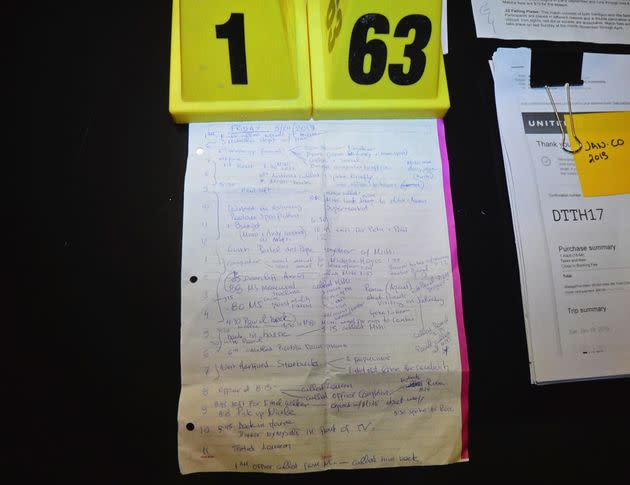
Schoenhorn said that Troconis’ inconsistent statements were a result of aggressive police tactics that affected her memory and confusion because English is not her native language. (She is originally from Venezuela.) Her police interviews were all conducted in English, but she used a Spanish interpreter throughout the trial.
Jurors were shown video of her three police interviews in their entirety, hours of footage filmed at Jennifer Dulos’ house, and traffic and security video of the various vehicles driven by Dulos, Troconis and Gumienny on May 24.
Troconis’ movements that afternoon were of particular interest to investigators and highlighted by prosecutors in their closing arguments. She made five trips back and forth from the home and office she shared with Dulos on Jefferson Crossing, to the empty property he was preparing to sell on Mountain Spring Road, two miles away. Dulos stayed there the entire time, close to 3 1/2 hours.
During that time, prosecutors said, there were three different “fire events” at Jefferson Crossing. Based on a neighbor’s security video of smoke billowing from the chimney — and its absence — prosecutors alleged that Troconis was burning evidence.
Although Schoenhorn countered that Troconis enjoyed having fires in the fireplace year-round, the prosecution emphasized that this was the Friday before Memorial Day weekend, a warm day and an odd time to light several different fires.
Meanwhile, prosecutors said Dulos was cleaning Gumienny’s Tacoma, which he allegedly used to transport his wife’s body, and bagging up the evidence. When Gumienny showed up unannounced at the Mountain Spring Road property to pick up his truck, Troconis took his keys to dissuade him from taking it. He insisted, however, because he needed it to transport his dirt bike home.
Gumienny was a key witness for the prosecution and was granted immunity to testify.
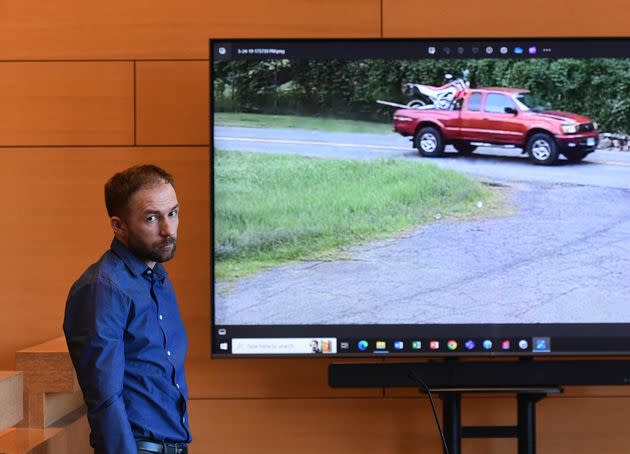
When he returned to Farmington with his Tacoma after Memorial Day weekend, Gumienny testified that Dulos and Troconis took it without his knowledge or consent to a car wash to have it cleaned and fully detailed — twice. Then Gumienny said Dulos repeatedly urged him to replace the Tacoma’s seats, which he eventually did, but held on to the original ones. Ultimately he handed them over to investigators, who said they found evidence of Jennifer Dulos’ DNA on the passenger seat.
Dulos might have had an additional sinister intent when he borrowed Gumienny’s truck.
Just before Jennifer Dulos’ disappearance, Fotis Dulos shaved his head — a deliberate attempt, investigators believed, to mislead any witnesses into thinking he was Gumienny, who had a similar hairstyle.
Gumienny said he even made a joke about it when he found Dulos and Troconis at a property they claimed to be cleaning the afternoon Jennifer Dulos disappeared.
“You shaved your head. You’re wearing dirty old work clothes. You trying to be as handsome as me?” Gumienny testified he told Dulos.
Troconis had a greater motive than just helping her boyfriend, prosecutors said. She hated Jennifer Dulos, Supervisory Assistant State’s Attorney Michelle Manning said Tuesday, and wanted to end the “two years of torture” she endured, including being barred from her home during Dulos’ visitations with his children.
“The frustration turned to anger and hatred,” Manning said, quoting Troconis’ own interviews when she described Jennifer Dulos as “manipulating,” “angry” and “toxic.”
In one of the most dramatic moments of the seven-week trial, Gumienny recounted what Troconis said when Jennifer Dulos refused to allow their children to say goodbye to the ill family dog before Fotis Dulos had him put to sleep in the spring of 2019.
“That bitch should be buried next to the dog,” Gumienny testified.
In the final closing argument, Assistant State’s Attorney Sean McGuinness repeated Troconis’ derogatory comment but said this case was about “a mother’s worst nightmare.”
“It is about a mother being taken away from her children, in life or in death,” he said. It is about Dulos’ children, “who went to bed on May 24 not knowing where their mother was, and she has still not arrived.”
In a statement shared with HuffPost, Schoenhorn said he is “extremely disappointed in the outcome” of the trial and reiterated his previous contention that Troconis’ inconsistent accounts were partly the result of her police interviews being conducted in English without a Spanish interpreter, saying that “played a major role in the verdict.”
“I think it was unfortunate that the interrogations were conducted in a manner and in a language that led her to contradict herself, and I understand how that would be used against her,” he said, blaming “hindsight bias” for the jury’s finding that Troconis knew in advance that Fotis Dulos would kill his wife.
Paul J. Ferencek, state’s attorney for the Stamford/Norwalk Judicial District, commended the jury and offered condolences to Dulos’ family in a press release after the verdict, promising that their work on the case isn’t over.
“While it’s our hope that today’s verdict brings Jennifer’s family and friends some peace, we also hope that someday we can provide resolution to the still unanswered question of where Jennifer rests. I assure you the State of Connecticut and this office will never stop looking,” Ferencek said.
Troconis also faces a contempt hearing on March 5. During the trial, a friend of Jennifer Dulos told prosecutors that a sealed report related to the Duloses’ custody battle had been displayed on Troconis’ laptop in a very large font that could be read by people in the courtroom. In response, Judge Randolph restricted the use of computers in the courtroom to attorneys.
Troconis is scheduled to be sentenced on May 31. The court clerk originally proposed May 24, which Schoenhorn suggested would be “inappropriate” — it marks the fifth anniversary of Jennifer Dulos’ death.

